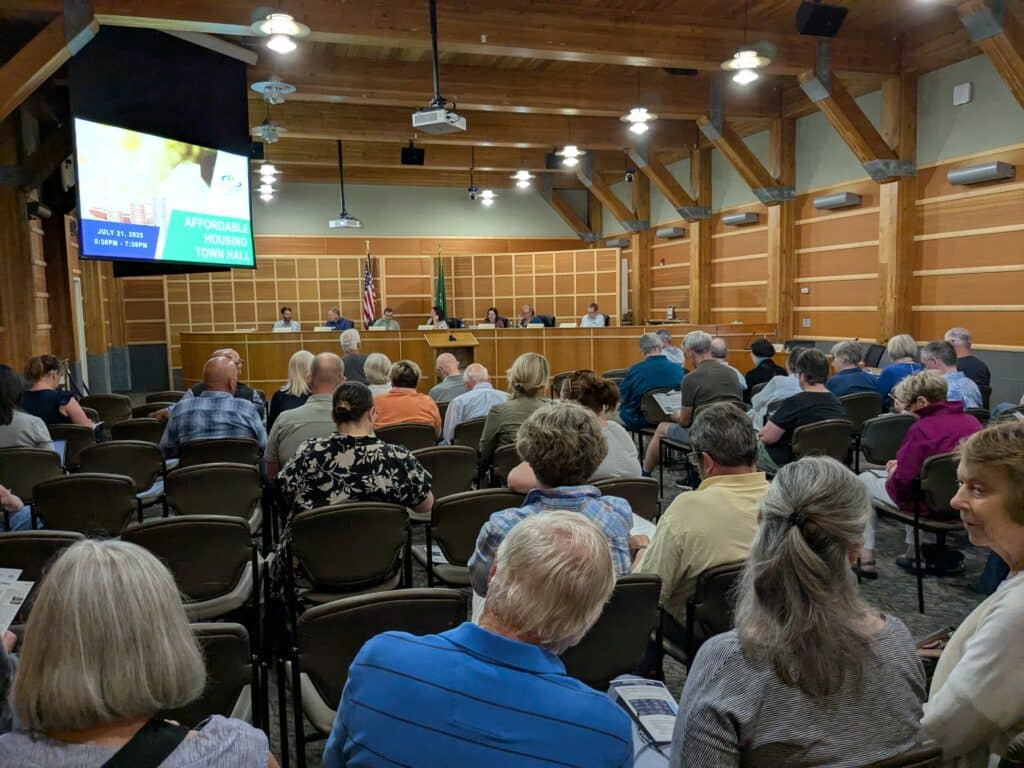Business Community Government
Town hall crowd skeptical of tax break for affordable housing
Editor’s note: This article has been corrected since it was first posted. The updated article clarifies information about the multi-family tax exemption.
Gig Harbor officials are discussing ideas to encourage construction of more multi-family housing and address the city’s need for affordable units. The idea has already drawn the ire of some residents.
During a two-hour town hall at the city’s Civic Center on Monday, July 21, city officials attempted to placate concerns about a Multi-Family Tax Exemption (MFTE) program. Officials say the city can leverage the tax exemption to bring affordable units to the city at little to no public cost.
City staff also presented several other possibilities to boost affordable housing, including housing vouchers, low-income housing tax credits and others.
MFTE
MFTE programs have become increasingly popular across Washington after state legislators approved an expansion of the policy in 2021. It allows cities to offer a property tax exemption on residential construction for a period of eight, 10, 12 or 20 years to qualifying and vetted projects.
In exchange, cities get a guarantee that a portion of those units will remain affordable to people making less than the annual median income, which was $119,018 in Gig Harbor during the first quarter of 2025, according to the Washington Center for Real Estate Research.

A crowd filled the council chambers at the Civic Center for an Affordable Housing Town Hall on Monday, July 21, 2025. Photo by Conor Wilson
Cities that establish an MFTE program may grant a tax exemption to qualifying developments of at least four units that are located in designated target areas. Gig Harbor has neither established a multi-family tax exemption program nor set any designated target areas.
The Gig Harbor City Council heard a first reading of a multi-family tax exemption program ordinance in April, but asked for clarification from staff. After hearing from residents, the city opted to have the town hall before considering the issue.
“At this point, the city council is not scheduled to further consider a multi-family tax exemption,” city spokeswoman Lori Maricle wrote in an email to Gig Harbor Now.
But officials say the idea is extremely efficient and cost effective. Few other tools create an assurance of affordable units, said Eric Baker, Gig Harbor’s community development director.
“There’s not a lot of programs that can create that guarantee,” he said. Most “just make it more likely.”
Need for housing
And there is a clear need for more affordable units.
The Washington Department of Commerce projects that the state will need 1.1 million homes by 2044 to keep pace with population growth. To help meet that goal, Washington adopted a landmark bill in 2021 that required all cities to plan and accommodate housing for all segments of the economic spectrum.
In Gig Harbor, average rent has ballooned from $1,073 in 2015 to $2,081 in 2025, according to the Washington Center for Real Estate Research. That outpaced growth in wages and Social Security benefits, leaving many unable to afford to live or stay in the city.
Adults 62 and older represent a majority of those burdened by housing costs. That group comprised 73% of “low income” residents in city limits and 60% of “extremely low income” residents.
Those who worked in the city also largely appear unable to live in it. Nearly all, 96%, of the city’s workforce resided outside city limits, according to the city’s housing plan.
“Housing affordability remains one of the most pressing issues for communities around Washington,” Shea Smiley, the city’s housing health and human services program manager, said at a past city council meeting discussing the MFTE. “Gig Harbor is no exception.”
Tax shift
Most residents at the town hall seemed to agree about the need for housing. But they took issue with the MFTE program, particularly the tax shift that would occur.
If the city ultimately decided to give out an exemption to a developer, the revenue does not go unpaid. Instead it would be split among the other taxpayers.
Baker said without specific legislation, he could not say exactly how much that would raise property taxes, but he suggested the cost would be low. Using a 200-unit development as an example, he said the average home in Gig Harbor would see an increased tax of anywhere from nothing to $85 per year.
Residents took issue with this. One said property taxes rose significantly in the last decade, noting that rates on the three rental properties she owned had all nearly doubled. Another said they were worried that the city would offer “a financial incentive to a private developer who is simply looking to make a lot of money.”
Private market doesn’t favor affordable housing
Without exemptions, the private market is unlikely to build affordable housing, said Eric Guida, a senior planner with the Washington Department of Commerce.
“The private market will likely produce and historically has produced single-family detached housing,” he said. “For lower incomes … the private market is unlikely to provide this housing. It will likely require subsidies and other support.”
Anne Fritzel, growth management housing section manager with the Department of Commerce, said the state has had a MFTE program since 1993. It has proved to be the most valuable tool to produce affordable housing, often at a fraction of the cost to the public.
“There’s other ways to get affordable housing. You can offer a bonus density to developers so they get more units provided that they’re offering that housing,” she said. “But MFTEs has helped in the production of half of the affordable units in the state with little or no public money.”
